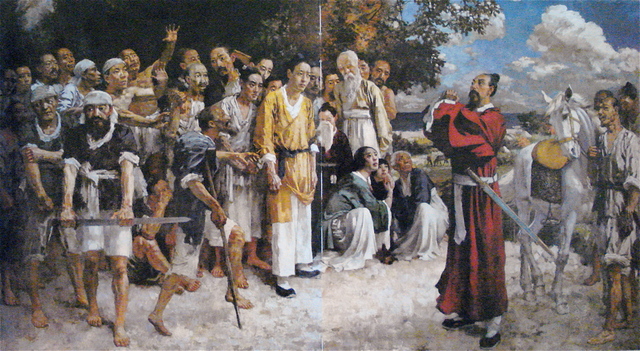
By Xu Beihong. “Tian Heng and His 500 Retainers.”
Tired, defeated, and disillusioned stood the peasants in a post Opium War China.
Qing authorities hustled to prove their authority over their land but eventually the disenthralled Chinese peasants saw a glimpse of hope in the assembling Taiping Rebellion. In a time of such low spirits Christianity was the holy grail of opportunity. In order to “wipe out the demons immediately” lengths were taken to ensure strict separation of the sexes in order to avoid “debauchery and violation of Heaven’s commandments” (Worlds Together, Worlds Apart, 250). Hong Xiuquan, met Christian missionaries in the 1830s for the first time. As an optimistic and ambitious individual he created the Society of God Worshipers in the 1840s leading to the establishment of the Taiping Heavenly Kingdom in 1851. To the 13,156 destitute, exclusively-lowest-class-men involved in the rebellion the idea of finding unity and justice through the rights endowed by God seemed like a very fruitful and praiseworthy plan. The group consisted of miners, peasants, pirates, and demobilized soldiers all working towards the same goal. The rebellion was targeted to bring an end to the outdated traditions and unjust practices that the Qing dynasty had enforced as well as the overbearing presence of Europeans in their trading ports. The oppressed knew that the dynasty, which was implementing these practices on the entire country, thus taking a “master” role, was unjustified in doing so. There would be no private property and the sexes were separated to keep from temptation that would only lead people astray from their path to God. The Confucian content of the civil service exam, the same one Hong failed four times, were to be replaced with translated verses from the Bible. Women were allowed to serve in the army, which was an extremely radical concept at the time. The rebellion itself was extremely forceful and brutal. Hong used the power of public preaching to spread word of the movement. Converts recruited to the movement were forced to completely forget about their past lifestyles in order to repent and be “saved.” the movement, which began locally in southern China, grew to fit on a grand scale through organizational sects in different areas working together. In a way the community created by the Qing dynasty was quickly replaced with Hong’s followers attempting to establish God’s kingdom on earth. In 1860 a failed attempt to invade Shanghai was the hindrance that finally slowed down the Taiping’s momentum. In 1864 Hong died and the Qings became victorious. In Nanjing 10,000 rebels stood bravely waiting for their deaths, refusing to surrender. The defeat was treacherous. The goal of all resistance movements is simply to create a more fair and peaceful society. In the case of the Taiping Rebellion, neither was achieved. Though his actions were intensely abrasive, creating chaos as a direct result, the impact of the rebellion in the distant future made it an effective fete. the Qing dynasty was never able to fully recover and regain authority over the country. Many immoral practices were outlawed such as foot binding and slavery. The Taiping rebellion also marks the end of China’s isolationist outlook. Later rebellions that drew ideas from the Taiping helped to orchestrate China’s place as an active part of the international community.
The Taiping Rebellion changed China’s traditions forever.
back